The First Morning with B. Lat
Kicking off Cup practice at Lake Hamilton with the South Carolina pro
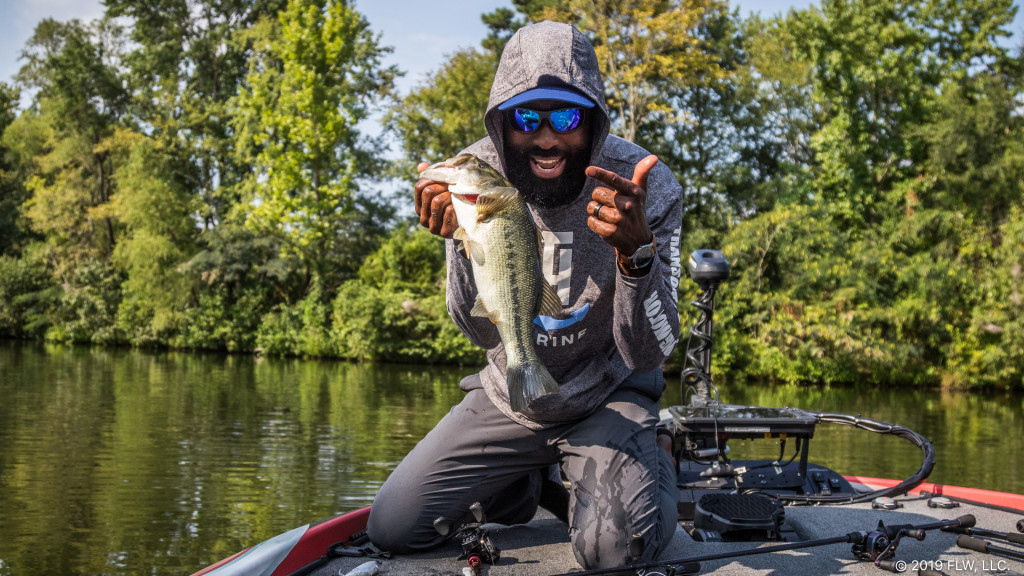
You won’t hear Brian Latimer complain about hot weather and tough fishing in Arkansas during this week’s FLW Cup at Lake Hamilton. For B. Lat, sweating it out on the water is vastly better than working in the heat installing landscaping and mowing lawns for a living, which is what he was doing just a few years ago.
A lot’s changed since those days. Now, Latimer is an FLW Tour champion, with a growing fishing media company and his first shot at a Cup title.
His chase for the Cup is where I catch up with him. It’s day one of practice for the championship event, and it’s time to see what Latimer can do on what promises to be a challenging late-summer fishery.

Latimer’s text rings in right as I’m starting the truck at about 5:30: Take your time. No one is up and moving yet so I’m blocked in.
Sounds good to me. I grab some breakfast and a cup of coffee before punching his rental address into my GPS. Like he has all year, Latimer is staying in a house on the lake with Scott Martin, Tom Redington, John Cox and Andrew Upshaw (they’ve combined for three Tour wins this season, by the way).
I roll in 15 minutes later, and no one is in a hurry to get started. They can’t start fishing until sunrise at 6:25 anyway.
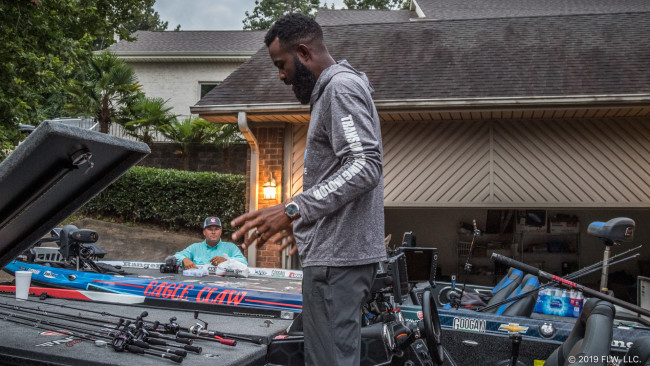
Everyone but Cox, who’s still making his way into town from a tournament in La Crosse, Wis., is out front loading rods and getting ready for the day.
Latimer takes a few minutes to chat and film with Martin and get the last of his gear ready.
“It’s Sunday,” he tells me. “Sunday.”
In other words, he’s not feeling pressed for time. There are four practice days for the Cup and only 7,200 acres of water to see. So we pull out from the house at about 6:45 to make a quick run to the grocery store.


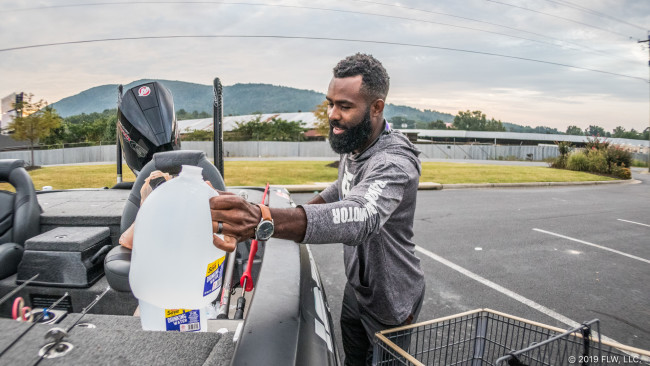
Ice, sandwiches, a couple gallons of water and one bass pro careen across the grocery store parking lot. Might as well have some fun during Cup week, right?
Latimer loads his groceries and tops off his boat with a few gallons of fuel, then reverses course and heads back toward the house.
The crew has access to a small boat ramp right down the street, and at 7:15, I splash him in to start the search.
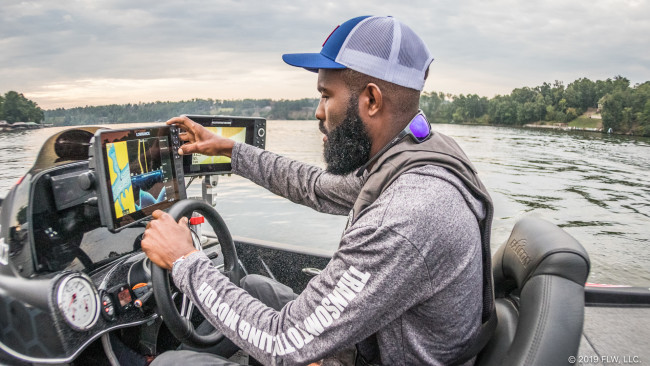
Despite a lot of online research prior to this week, Latimer doesn’t exactly know what to expect from Hamilton. He’s never been here. Right away, he’s surprised by how narrow this section of lake is. We're in the upper end.
By chance, he idles over a piece of brush, which garners a quick look before putting the boat on pad and heading across to the opposite bank.
“I’m just going to fish until it gets hot. Then I’ll go run around and look,” Latimer says.


First things first, the Carolina pro has to get comfy.
“It’s time to get out of these shoes. It’s totally unnecessary.”


His bait selection is about what you’d expect for midsummer in Arkansas: a few topwater baits, a Texas rig and some finesse plastics.
Cast No. 1 is toward a seawall with a buzzbait.

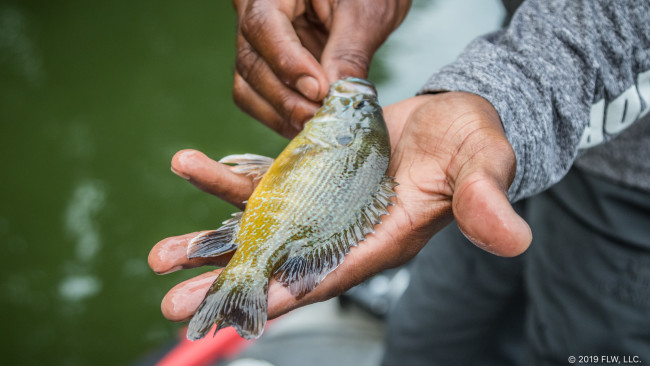
The goal this morning is to not waste any time, and to cover water to get a feel for the lake.
Hence, Latimer makes quick work of a few pockets and some main-lake shoreline. He doesn’t bother skipping way under every dock or slowly needling every piece of cover. Instead, he’s chucking and winding.
At 7:30, he gets the first bit of fish slime on the hands, but it’s a bream not a bass.

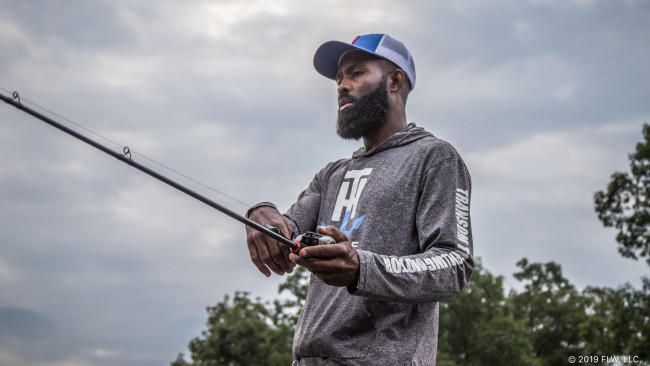
Predictions for this Cup have been pretty consistent. Most pros think the winning weight will be in the mid-30s for three days.
“Double-digits is gonna be good,” Latimer predicts, referring to daily weights. “That’s why I’m kind of excited about this tournament. I’ve fished a lot of tournaments like this at home.”
He switches to a finesse worm for a little bit without really slowing down and fires a cast to anything that looks good.
Latimer loves finesse fishing. It’s a product of his upbringing around clear, deep fisheries in the Carolinas. He feels at home in this region.
“I know it’s gonna be tough. That’s what makes me comfortable,” Latimer adds. “I don’t have to be on 18 pounds.”


It’s nearly 8 a.m. before Latimer pulls the trolling motor and runs up the lake a short ways. Some stick-ups on a main-lake flat draw his eye, and he pulls in and fires the finesse worm.
Behind the flat is a small pocket strewn with wood. He heads there next, then follows the bank back out to the main lake.
The first bass of the day finally comes aboard. It’s a couple inches shy of keeping; seemingly nothing, but still Latimer makes a mental note of it.
“I can’t tell you how many times I’ve been practicing and caught one like that and been like, ‘ah, whatever.’ Then three days later I’ll be like, ‘remember when I caught that 13-incher?’”


Latimer keeps up the pace, firing a finesse worm and then rotating topwater baits. He gets another short bass on each.
“I’m just looking at the lake while fishing,” he says. “If I happen to catch one, that’s a bonus.”
After a while, Latimer sits down at the console to plan his next move and do a bit of map recon. He’s still in the upper end of the lake, but he’s already looking at the lower end.
“OK, I’m making my prediction, and I haven’t even seen it yet: It’s gonna be won within three miles of the ramp. There’s just so much structure there.”
With that, he fires up his Mercury and pushes on.
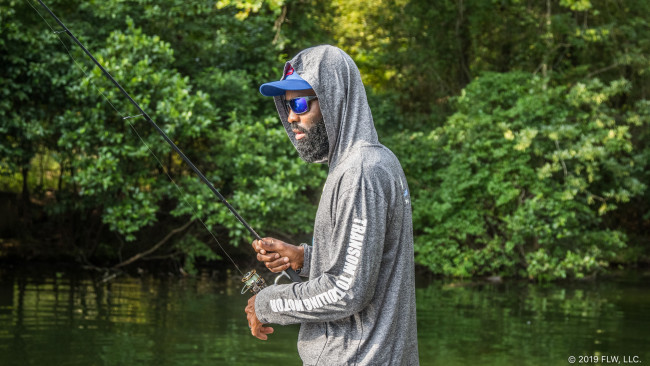

The sun starts to peek out as Latimer makes his first flip to some laydowns. Fishing under overcast conditions early made for a comfortable morning, but the sunshine has its advantages.
“One thing about the sun is now I can see,” Latimer says. “A lot of times it’s all about executing on things we see in practice. I wish people could understand how few fish we catch in practice. I’m not talking about shaking them off; I’m talking about only catching three fish sometimes.”


Latimer gets into a little flurry of fish, though not one of them would keep. One swipes at his topwater in front of a dock, misses, then comes back for it. Another comes up twice and misses. And a third eats by the corner of a different dock.
“I probably need to stop catching them,” he adds. “That’s not a big one, but eventually it could be a good one.”

The next stop is the mouth of a large shallow pocket off the main river. Latimer instantly likes what he sees.
“There’s fish somewhere right around here. I promise you that,” he says.
He starts off blitzing along the point at the mouth and then into a small adjacent cut, makes the turn around the back end and quickly proves himself right by connecting on a small keeper. It’s the first decent fish of the day.
“That’s the kind that is gonna be gold in the tournament,” he says. “I don’t think it’s 3 pounds, but it might be close.
“I already see if you spent eight hours doing this you’d get your five. Don’t think about it; just go throw.”
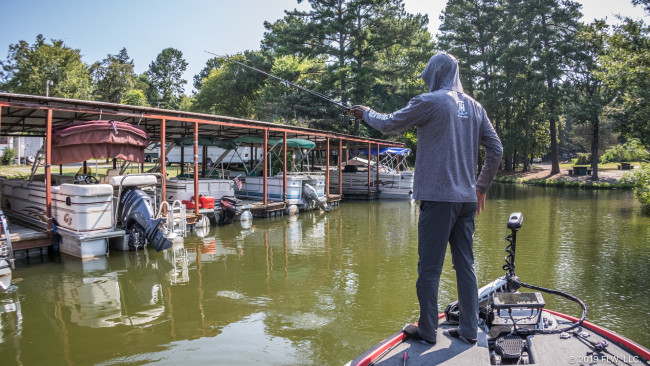

A quick rip across the lake lands Latimer in a pocket with a small marina. He does more of the same, tossing a topwater along the bank and pitching a worm around some dock slips.
Latimer didn’t pre-practice for the Cup. He spent his down time between the Champlain Tour finale and the Cup enjoying a slice of summer with his family. But he also worked in a lot of pre-tournament research.
“As genius as it sounds, I tried to figure out what kind of lake it is,” he says of his online study. “What’s the context of bass fishing we’re going to be dealing with, and what kind of fishing that I like to do can I do there?”
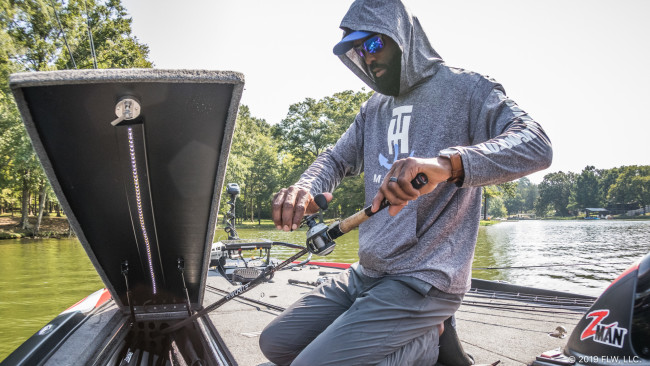
He doesn’t get any bites in that pocket, which isn’t all that surprising.
“It’s typical summertime fishing. You go into one pocket and get a bite, go into the next pocket and get none, go into the next pocket and get a bite, go into seven pockets and get none. I can’t put a theory on it yet.”
Before leaving, the pro digs into his rod locker to initiate some “controlled chaos.” He hauls out seven or eight more Favorite Fishing rods with plans of hitting some nearby bridges and changing things up a little.

It’s about 10:30 now, which is close enough to lunchtime for half a sandwich. Latimer wants to fish a nearby bridge, but there’s already a Cup angler on it, so he jets back across to the big pocket where he fished before. This time, though, he runs about halfway back.
This pocket is big and flat. There’s a nice stain to the water, with a lot of wood cover and some shad flipping at the surface. He likes it instantly and goes to work with his usual shallow rotation.

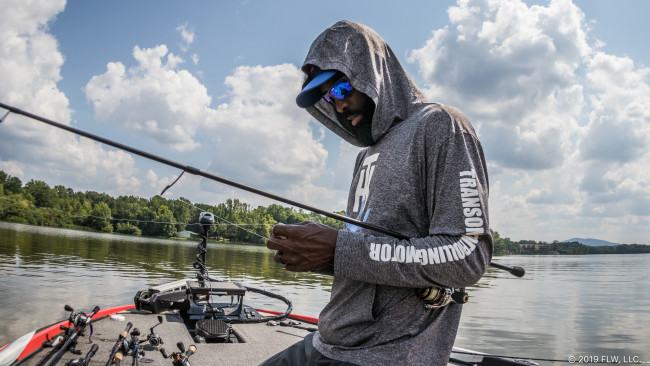
So far, Latimer is all business, calmly picking apart whatever is in front of him. There’s no pressure this morning.
“I’m kind of disappointed in how nervous I am about it [fishing the Cup]. I mean, I’m not nervous,” he says. “I’m excited about it. I’m thrilled. I’m ready to go to work this week. But I thought I was going to be like, ‘this is the freakin’ Cup.’ I’m not uptight about it at all.”

He does start to perk up a little more as he gets farther into this pocket. It’s the kind of place where he figures he needs to fish every inch, which his what he does. For the next 20 minutes he dissects every piece of cover along the bank.
“Dude, this is one of those places you win in. I say that, but I haven’t even had a bite yet. I just smell it.”
Some flittering shad draw Latimer out into the middle of the pocket and onto a broad flat, where he finally sets the hook on a white bass. That’s what’s chasing the bait, but there might also be black bass in the mix.
“I bet at some point they come up schooling,” he says.
Sure enough, a couple minutes later Latimer spies a small flurry of surface activity. He’s not the only pro to see it, though. There’s another Cup qualifier in the creek, and he’s looking right toward Latimer’s boat.

He keeps working around the flat, scoping out little ditches, holes and high spots and pitching toward some laydowns and other wood cover. One fish follows, but Latimer can’t verify it’s a black bass.
He still likes what he sees.
“You’d be surprised how shallow fish get this time of year, into the end of summer,” he says. “There’s no oxygen in that deeper water.
“This could be a morning thing. I’ll visit this again later on in practice. It could be very time sensitive.”
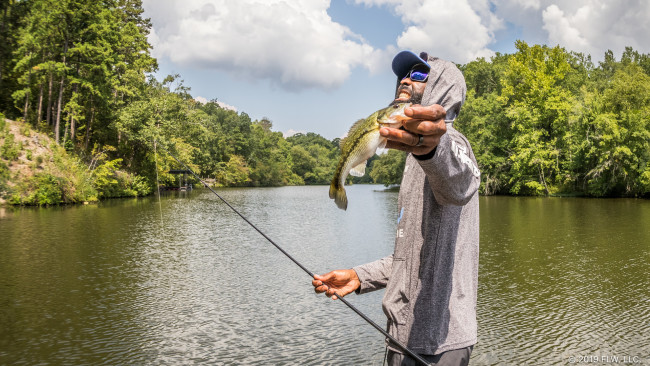
Eventually Latimer slides back to the bank to continue torching the shoreline cover. A feisty spotted bass is the first taker.
Catching spots is old hat for Latimer, who grew up Belton, S.C., dreaming of being a bass pro. As a kid, he was a talented tennis player. He could’ve gone to college to play tennis, but the thought of being away from his boat for that long terrified him.
Instead, he went to trade school to study horticulture and worked with his dad, Jimmy Latimer, on his landscaping crew.
“I wouldn’t work anywhere else because I knew it would separate me too much from fishing,” Brian recalls.
The problem was, he was fishing too much. One year, Brian was leading the points race in a BFL division with an event coming up, and Jimmy gave him an ultimatum: Go to work, or don’t come back to work.
Wisely, in this writer’s opinion, Brian went fishing.
“I cried for about a week after that. Then I went out and bought a lawnmower and never looked back,” he says. “If he hadn’t fired me, I’d probably still be working there. It actually ended up being the best thing that happened to me.”
In 2005, Brian started his own landscaping company, which set him up with the finances and the free time to pursue his real dream of fishing.
Obviously, it’s paid off. His landscaping business is idle, but his fishing business is full tilt.
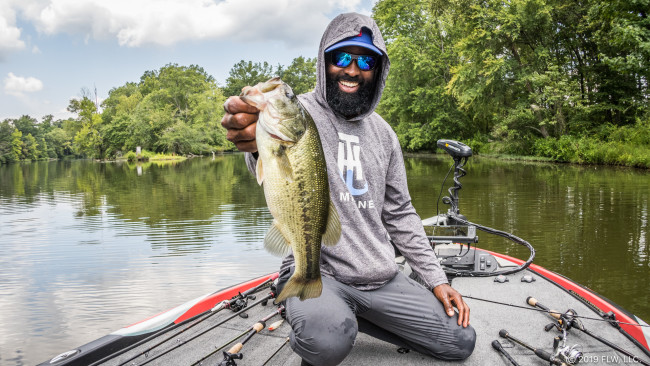
Now Latimer is way in the back of the pocket, slinging away with topwater mostly. When his bait passes over the end of a shallow laydown, a little pack of bass follows it out. He spots them just as he pulls the bait out of the water.
“They’re still there. There’s like six of them.”
A quick pitch back in has the bait in their face, and treble hooks wind up in the mouth of another small keeper.
“You see how much water you have to cover to get one bite,” he says. “I still think this is going to be the least productive end of the lake.”

The exploration continues. Latimer trolls all the way back until a rocky shoal blocks his path. Jumping shoals is nothing new to the Carolina angler, so he trims his motor up and pushes through.
“If there’s ever a time to try to get in here, it’s now.”
He spends about 10 minutes back in the creek but never gets a sniff.
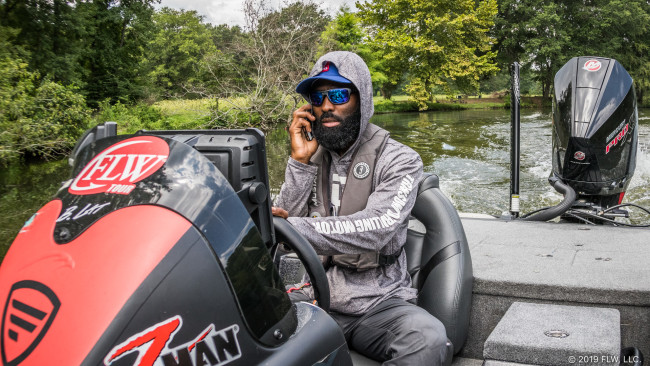
Shortly after noon, Latimer idles back out to the main body of the creek and calls his wife, Rachelle, to check in. They chat awhile, and Brian reminds his son, Brevyn, to ride his dirt bike that evening. Brevyn races, and dad wants to make sure his son stays sharp.
Then it’s back to work. For the next 20 minutes or so, Brian fires toward a few schoolers and fishes whatever looks good around him. He gets a few small bass to come up and take a swipe at a topwater, but never a keeper, and he doesn’t stick a single one.

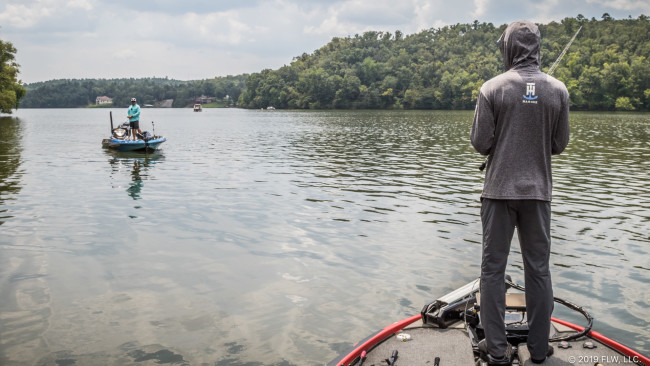
It’s been a couple hours since Latimer pulled into this creek, and he figures he’s been there long enough. But he just can’t resist the urge to check out the opposite shore.
Three casts in on the other side, Angler of the Year David Dudley calls. Dudley and Latimer share morning reports. It sounds like the AOY has had a slow start, too. Then Latimer goes back to work: burn a topwater, sling a finesse worm, cover water.
Though he never gets a bite on this stretch, Latimer stays loose. He calls his dad to chat for a few minutes about a project at home, scopes out some bream beds and takes a few seconds to joke around with Scott Martin when they pass each other out by the mouth of the creek.

Latimer spent a big chunk of his morning working one section of the lake, and he has a solid idea of how he could get some bites. The problem is there were a half-dozen other anglers fishing the same water, and these likely aren’t fish that replenish. Plus, he’s pretty sure there are better areas on Hamilton.
That means it’s time for him to roll, and me to leave. Latimer stuffs the rest of his sandwich in his face as he drops me at the dock.
There’s not a ton of water on Hamilton, but there’s a ton of opportunity, and Latimer knows it. He’s looking for the kind of life-changing win that can ensure he gets to spend the rest of his career chasing bass and chasing his dreams.
He’s got three and a half more days to figure out how.